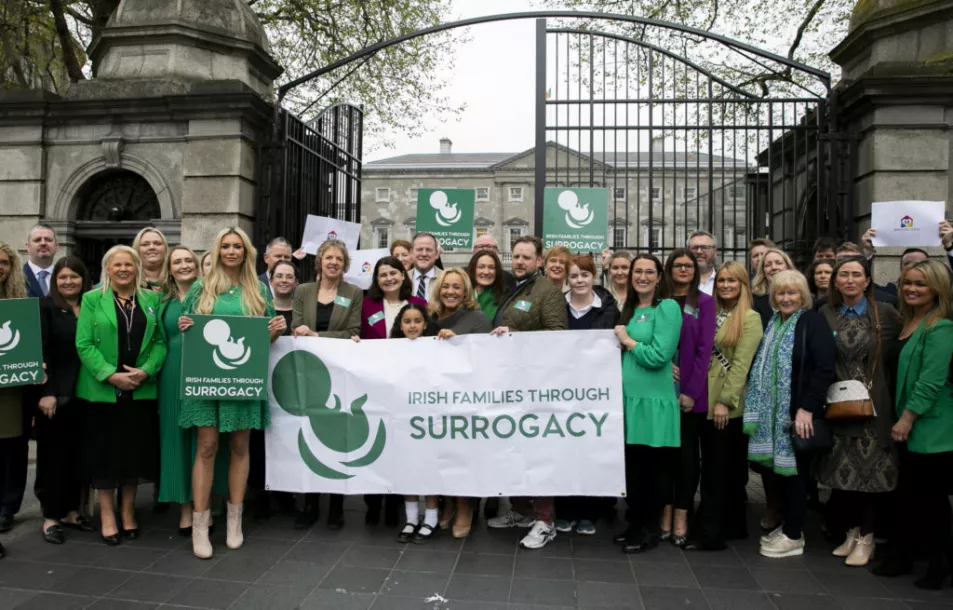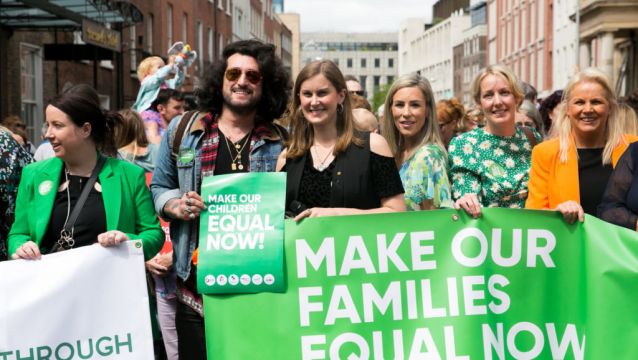Cabinet approval for international surrogacy legislation has been described as a "massive step forward" for Irish families with children born through surrogacy.
This week, Minister for Health Stephen Donnelly said that the Assisted Human Reproduction Bill will "set out a process for future surrogacy both here in Ireland and internationally" while also providing a pathway for retrospective parenthood.
Surrogacy in Ireland is currently unregulated.
This means that Irish children who are born through surrogacy to either opposite sex couples, same sex couples or couples/individuals who have medical and/or fertility challenges have no legal relationship with their parents once they arrive home to Ireland.
To be granted parental rights, the child's genetic father must complete a costly, long court process which can often leave the child legally vulnerable for years.
The child's mother or non-biological parent currently has no pathway to parenthood and is a legal stranger to their child.
The new Bill will regulate surrogacy, and give mothers rights, when it becomes law.
Irish Families Through Surrogacy (IFTS) spokesperson Sara Byrne told BreakingNews.ie: "There are 234 pages of amendments that have been drafted for this surrogacy legislation, so we haven't had eyes on it yet, but Minister Donnelly met with us and some of the other advocacy groups to give us an overview of what to expect... which we really appreciated.
"We're hopeful that the contents of the legislation will reflect what we have been advocating."
I didn't think at the start of this she would be starting Junior Infants, and I'm still a legal stranger to her.
Advertisement
Ms Byrne's four-year-old daughter is starting primary school, and she said "I didn't think we'd still be in this position".
"I didn't think at the start of this she would be starting Junior Infants, and I'm still a legal stranger to her. I didn't think we'd still be in this position, but we have to hold on to the fact that progress is happening and this was a really big step forward.
"We're hopeful that the last few stages will go smoothly. There is good will in government to make sure it progresses.
"Please God this will be the last Christmas where my daughter will be unequal in Irish law. Hopefully, by next year it won't be a thought anymore, and we can know we are completely equal and recognised. That will be a massive day.
"We're so proud the Irish Government has taken this on. It is a complicated area, but every stakeholder involved has been consulted. Ireland has been a leader in this."
Ms Byrne said the legislation is also important for domestic surrogacy.
The Government believes there are up to 500 families in Ireland that will be able to access the new legislation retrospectively.
She stressed that all the Irish families who have received help from IFTS have gone through ethical surrogacy.
While some people have criticised international surrogacy, Ms Byrne feels some of this comes from a lack of knowledge about it.
She said her family remains close to her surrogate, adding that this is common.

"We're still in contact with our surrogate weekly and that reflects the experience of a lot of families. It's wonderful that it will be properly regulated for couples who can do it here... and those who need to travel as well.
"IFTS thoroughly advocate for ethical surrogacy. There are varying levels of contact, but we have nothing but absolute respect and admiration for these women and their incredible acts of kindness. Every family we have dealt with has gone above and beyond to make sure they are treated well.
"Hopefully, as surrogacy becomes more normalised, the naysayers will realise the reality of it is so positive."
Problems that parents have at the moment include the fact that mothers cannot sign for medical forms or travel.
"My daughter is starting primary school, and we'll have to explain the whole situation. I was granted guardianship when she turned two, but a lot haven't done that in the hope this legislation comes through quickly.
"You can't sign a form for your child, so many things you'd never think of.
"We often have enquiries about people who want to visit family in the UK or further afield. Do they need paperwork if their husband or partner isn't with them? All these things that other families don't even have to think of.
"I personally had the situation of being the mother sitting distraught in the hospital carpark when my daughter was unwell, and I couldn't be in there with her."

Ms Byrne said the new legislation will help families who are embarking on a surrogacy journey, and those who have already been through it.
"A lot of people give out about government and engagement, but our experience has been very positive. We have met with the three ministers involved, Minister Donnelly, Minister McEntee and Minister O'Gorman, and their officials. They've kept us in the loop and listened to our concerns.
"A lot of us brought our children to the demonstrations for the people in power to meet them... to show the whole point of this is for these children. They are no different to any other Irish children.
"Nobody's story is the same, and it has been a last resort for everybody. Even when it was suggested to my husband and I, it seemed so abstract and unachievable, and it was through meeting couples myself and chatting to them, I saw it was possible... normal people in extraordinary situations."







